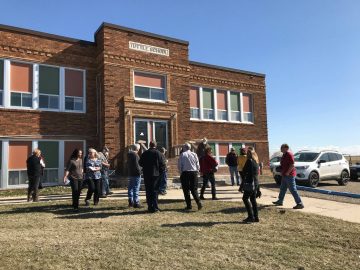Story
Remaking the Grade
Tuttle Rural Innovation Center rescued an abandoned school to engage a North Dakota community
DATE
May 14, 2021

By Kayla Schmidt
Every business and service has heightened importance in a rural community. Even a slight ebb in population can be enough to cause the grocery store, post office or school to falter. And then, the whole town could follow. In the small community of Tuttle, North Dakota, Burdell Johnson has helped keep his hometown alive by turning its local school building into something no one could have predicted: a hub for community connection and economic development that extends far beyond its four walls.
A farmer and rancher by trade, Johnson was a student at the Tuttle School, and later served as a member of the school board for four decades. Built nearly a century ago, the school closed its doors due to a lack of students in 2007.
“I wasn’t about to let the building turn into an eyesore,” Johnson says. But more than just repurposing the building, he says, “Our goal was to find a project that could use this forgotten building and create a model for other communities to grow from.”
Called the Tuttle Rural Innovation Center (TRIC), Johnson’s project is a budding hub for economic opportunity and innovation that could potentially reach far beyond a 110-year-old plains community of about 80 residents. TRIC’s mission is to be a catalyst for collaborative work addressing major challenges of rural life using food, arts, entrepreneurship, training and community connection for the 2,500 people in the surrounding Kidder County. Tuttle is not exactly the middle of nowhere, Johnson points out: “We’re not that far from anywhere in the state.”
A few years ago, Johnson’s vision took shape when he formed a valuable alliance with Megan Laudenschlager (BF’14), of Strengthen ND, a nonprofit dedicated to supporting rural communities and connecting nonprofits in the region to resources. (In 2020, Strengthen ND received a Bush Foundation Ecosystem Grant to support their capacity-building work.) “Megan makes sure we don’t have tunnel vision,” he says. “We listen to each other, share ideas. We don’t hold it against each other if we disagree — we hold it as a positive sign to stop and reconsider.”
With the assistance of Strengthen ND, TRIC received its first Bush Foundation Community Innovation Grant in 2017. The grant allowed TRIC to host community conversations on the project, create an economic development strategy and begin revitalizing the building.
TRIC brought in AmeriCorps volunteers to help clean up the building and convert classrooms into multi-use spaces. They developed community gardens, began offering food prep and nutrition classes, and provided food directly to folks in need. What was once the school cafeteria became a commercial kitchen with a pasta-making machine imported from Italy. This work led to North Dakota governor Doug Burgum presenting Johnson and the board with a Main Street Excellence Award in 2018.
TRIC soon expanded to offer office and meeting spaces for entrepreneurs and a fully furnished woodworking shop for local makers. So far, the building has also hosted events for all ages: from quilt shows to wrestling tournaments, and children’s birthday parties to book clubs. Johnson was amazed at the reach and positive reaction to an online live painting lesson. “I’m not a painter, so I didn’t know it would be so popular,” he says. “The sky is our limit; we could paint, or sew, or cook.”
The funds paid to rent the spaces for events go back into maintaining the building. Covering the heating and electricity bills has been difficult, especially in the midst of a pandemic. Not only that: They’ve had to get creative to ensure the aging building gets the care it needs.
“We put together a community room for the local guys to meet for coffee in the morning,” says Johnson, who is president of TRIC’s board. “It works two-fold. They come, have their coffee, but they also have their eyes open. They take care of the little things, like the furnace, that need to be fixed. Which helps make sure there’s always activity in the building.”
Looking to the future, the land surrounding the school building is expected to become an apple orchard in 2021, and TRIC intends to provide courses about North Dakota’s agricultural legacy. Funding allowed TRIC to temporarily hire a much-needed program coordinator, a position they hope to keep with a second round of funding. Johnson believes the right person in the role will elevate TRIC to its full potential, especially after the hiatus created by the pandemic. “We’re just a couple renters away from being totally self-sustaining in keeping the lights on,” he says.
With a 2020 Community Innovation Grant from Bush, TRIC seeks to grow its current programs and further integrate its collaborative mission into the rest of Tuttle. It’s also setting its sights on ambitious goals that could transform rural economies, such as assessing bringing all local entities under a nonprofit umbrella, and sharing its development model with other communities.
Some projects aren’t done for profit — and profit isn’t the type of success Tuttle is looking for. This revived schoolhouse on the prairie has a new identity that can serve the community needs of the present. “You know, you never look back,” Johnson says. “If you’re not moving forward … you’re never gonna be where you want to be.”
Kayla Schmidt is a North Dakota boomerang. She left her landlocked state to earn her MA in Creative Nonfiction and Biography Writing at the University of East Anglia in England before saying goodbye to the sea to return to the prairie. She is a freelance writer based in Bismarck.
Continue reading
-

News
Opportunity to work with us
As part of our office move later this year, we are exploring possibilities for the build out of the ground floor of the building. We are in the early stages of this and considering different types of operating models and potential partnerships.
-

Staff note
Coordinating the work of our contact hub
We aim to be radically open in all that we do, and that includes being more accessible to more people and sharing what we learn along the way.
-

Staff note
Making every dollar work through impact investing
We have benefitted from the experience of other funders as we developed our impact investing approach. Now we are paying it forward and sharing what we have done and what we have learned.